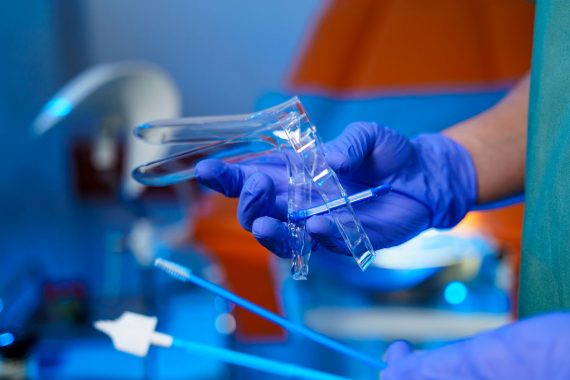Self-sampling HPV kits could increase cervical screening uptake

Offering self-test kits for cervical screening to be used in GP surgeries or at home could dramatically increase take up, NHS research has shown.
The YouScreen trial which gave self-sampling kits to test for HPV to participants who were least six months overdue for their cervical screening found it could be an effective way to tackle falling uptake.
They estimated that posting kits out to women where they had missed a smear test invite could boost screening England by about 400,000 each year.
It was the first-time self-sampling was offered within the NHS cervical screening programme and is the largest trial of self-sampling for cervical cancer in the UK to date.
The kits, which detect HPV to guide whether a follow up test is needed, could be used either at the GP practice or at home.
Self-sampling kits were offered to over 27,000 women and people with a cervix, aged 25-64 from 133 GP practices in north and east London between Jan 2021 and Nov 2021.
Of those, 8,838 people sent back self-samples; 64% were from ethnic minority groups and 60% from deprived populations.
The study also showed that 13% returned self-sample kits when mailed directly to them from the screening programme and 56% returned a kit when it was offered at their GP practice.
Publishing the findings in eClinicalMedicine, the researchers from King’s College London said the approach could also reach underserved populations.
Feedback from GP practices and trial participants was overwhelmingly positive, they added.
NHS leaders said they would be now be working with the UK National Screening Committee to consider the feasibility of rolling this out more widely across England.
Figures published earlier this month show that a third of those eligible did not take up the offer of screening, prompting NHS leaders to urge women to attend when invited.
Last year, the NHS pledged to eliminate cervical cancer by 2040 by making it ‘as easy as possible’ for people to receive a HPV vaccination and increasing cervical screening uptake.
Several countries already use the approach including The Netherlands, Australia, Denmark and Sweden.
Study lead Dr Anita Lim, a senior epidemiologist at KCL, said: ‘Women who don’t come for regular screening are at the highest risk of developing cervical cancer.
‘Cervical screening participation has been falling in England for over two decades; currently almost a third of eligible women aren’t getting screened regularly and in some parts of London this is as high as 50%.
‘It is crucial that we make cervical screening easier by introducing innovations like self-sampling, alongside the current cervical screening programme, to help protect more people from this highly preventable cancer.’
Professor Peter Sasieni, head of the research group at KCL and now at Queen Mary University of London, added: ‘Unfortunately, women born before 1990 are unlikely to benefit from the HPV vaccine so regular screening is vitally important to protect those who have not been vaccinated from this cancer.
‘YouScreen showed that this simple test is popular with both women and GP practices and could boost screening participation in England by over a million over three years. That in turn would help to accelerate the decline in cervical cancer rates.’
Clare Stephens, a GP and co-clinical director at North Central London Cancer Alliance, said: ‘In primary care we have been working for a long time to improve the uptake for cervical screening.
‘The results from YouScreen show that we can make a significant difference to the uptake of screening by offering an alternative self-sampling test instead of a screening appointment within the GP practice.’
Visit Pulse Reference for details on 140 symptoms, including easily searchable symptoms and categories, offering you a free platform to check symptoms and receive potential diagnoses during consultations.









